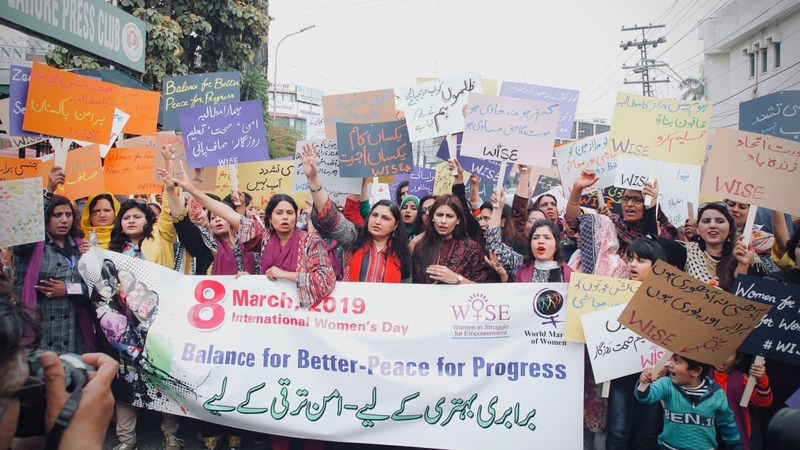Social constructionism and women empowerment
Pakistan has been on the crossroads of its social, political and economic destiny since day one. It remains trapped in the quagmire of economic stagnation, crumbling public faith in state institutions, a deplorable situation of law and order, political tumult, sex-based violence, low participation of women in political and economic sphere,illiteracy, quota system, sexual apartheid, deprivation of their fundamental rights, and an androcentric mentality because of a cultural relativistic approach. All these knotty issues have pushed the country into gender inequality by creating social, economic, political and legal impediments in the way of women empowerment.


In Pakistan, population of women has increased 1 percent from the population consensus of 1998. According to the population consensus 2017, total woman population is about 106.7 million of the total population of 207.8 millionof the country. But women are sweltering in the heat of sex-based violence and gender inequality. According to the book, “Pakistan: A Hard Countrywritten by Anatol Lieven, Pakistan is a multi-diverse country with a male-dominant culture, and people of the land are more committed to their cultural and traditional roots that pave the way of social, political and economic inequality for women. They are deprived of their basic and constitutional rights because of irrational cultural norms and practices.
Cultural relativism is another factor in the inequality. People crush any sort of intellectual or political resistant against their culture, and they feel proud of their culture, according to the theory of ethics. In Pakistan, cultural relativistic values have spoiled not only the aims and objectives of three waves of feminism but also Islamic rights for women. People are more concerned about their cultural norms and values than religion or any intellectual grooming. They prefer culture than religion in their practical life. Their living pattern sand gender-based roles are highly constructed on their culture with lesser influence of religion, morality or international movements. These factors lead to female subordination in household affairs.
The inhuman, immoral and non-Islamic traditional practices of waani, karokari, marriage with Quran, and honour killing are still being practised by people because of their cultural relativistic mentality. That is required to be changed following the exponential socio-political as well as the changing economic dynamics of the post-modern world.
In order to mitigate the effects of cultural relativism, various types of feminism have given divergent dimensions. They endeavour to figure out the causes of women issues. According to radical feminism, Marxist feminism and socialist feminism, women are subordinated by men because of their economic dependency on their male partners. Women work at home. They give birth and raise children andremain busy in household work such as washing clothes, ironing clothes and cleaning home, from day to night. All the work is unpaid. On the other hand, their partners are paid for their work. This inequality also aggravates violence and inequalities by empowering women less because of their economic dependency on men.
By giving womenequal economic opportunities, their issues,and particularly, violence can be eradicated.Our government should take precautionary measures to provide equal economic opportunities for women to reduce their economic dependency on their male family members. There must be a mechanism for housewives who are paid for their household work.
In Pakistan, cultural relativistic values have spoiled not only the aims and objectives of three waves of feminism but also Islamic rights for women
According to liberal feminism, women languish because state institutions and offices have monopoly of men. Women participation in politics and offices is discouraged by men because of the fear of losing the monopoly. Law making bodies and legislative assemblies are full of males. They legislate to empower men but not to women. This legal and political discrimination lead to women subordination indirectly. They cannot raise their issues on national level to redress them This discrimination gives way to women subordination and inequality.
From article 1 to article 25, legal provisionsare given to the fundamental rights of all the people of Pakistan without any discrimination, according to the Constitution of 1973. Government is less concerned about exercising the provisions practically. This negligence empowers males who are already in power. Women roles are limited in legal and legislative sphere. Legal provisions to women rights, strict punishments on inhuman and unethical cultural practices and increasing women participation in the political discourse can play a constructive role to empower women in Pakistan.
Certain steps by the state are required to address the challenges that are constraints in the way of women empowerment. Women must be provided fair and equal economic opportunities. Their rights must be granted legality. There must be a comprehensive mechanism to pay womenfor their household work. Women’s economic dependency on male relations should be reduced by providing them easy access to jobs. Women participation in politics and other state institutions must be encouraged by the state. Even the woman quota system in CSS, PMS, legislative bodies and other competitive exams seems to aggravate inequality as it stops greater women participation. Intersectionality must be prevailed to improvethe status of women in the country.
The writer is a feminist, human rights activist and legal researcher. He can be reached at Ch.changezi.sandhu111@gmail.com
Leave a Comment